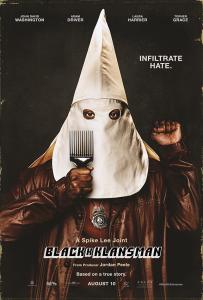By Christian Hamaker
Spike Lee has been making movies for 30 years, but he’s still fighting the same battles that have dogged him since his early films. Lee broke out with the independent hit She’s Gotta Have It, which was followed by the Columbia Pictures-distributed School Daze—a hit-and-miss musical that exposed Lee’s penchant for, according to his critics, too many story threads and an inability to craft a satisfying ending. Those accusations followed the filmmaker through Do the Right Thing, Mo Better Blues, Malcolm X and He Got Game—and that only gets us through Lee’s 1990s output. He’s made another 10 features since.
Despite Lee’s hit-and-miss oeuvre, his strongest work overcomes his excesses. Do the Right Thing is the best film of the 1980s, and Malcolm X is a masterful religious drama, anchored by a great performance from one of our finest actors. But when a Lee film isn’t working, the director’s flourishes can come across as inexplicable in their misguidedness.

Lee’s BlacKkKlansman is, sadly, in the category of his lesser works, its structural raggedness secondary to its sledgehammer treatment of racism. That’s a subject that certainly doesn’t require nuance, and with recent history having shown that racist views are, sadly, more prominent than many would like to admit, a film that tackles the subject directly could be timely.
Enter Lee’s film, based on a memoir by Ron Stallworth (played in the film by (John David Washington), who, in the 1970s, becomes the first African American detective in the Colorado Springs Police Department. After successfully going undercover at a Stokely Carmichael (Corey Hawkins) rally sponsored by the Black Student Union, Stallworth decides to go after the Ku Klux Klan, He phones the organization, says he’s interested in joining and earns the group’s trust. Invited to attend a Klan meeting, Stallworth sends a white colleague, Flip Zimmerman (Adam Driver), as his stand-in at the in-person gatherings.
BlacKkKlansman certainly tackles racism head-on, but its villains are so blatantly one-note in their vile expressions that viewers are never tempted to feel anything other than contempt for them. That approach might make for moral clarity in life, but in art, hitting on the same point, in the same way, over and over again for two-and-a-quarter hours leaves little room for engagement with the material. We know what we think, we know what the filmmaker wants us to think, and there’s nothing else to consider as the story drags out. A searing conclusion helps BlacKkKlansman considerably, but many viewers will have tuned out long before.
BlacKkKlansman is at its most interesting in Driver’s portrayal of a nominal Jew being forced to wrestle with his religious identity as he confronts the Klan’s virulent anti-Semitism. But there’s not enough of Zimmerman’s character to offset the simplistic, one-note racial and ethnic contempt of the various Klansmen the film introduces. Nor does BlacKkKlansman stand out as particularly memorable on a visual level. Shot by Chayse Irvin, the film’s most interesting shots include isolated, superimposed reaction shots during the Carmichael rally early in the film and a dynamic split-screen sequence much later. But those moments are very few and far between. Spike’s signature low-angle shot of characters appearing to float rather than walk comes late, and when it does, during a fiery finale, it feels long overdue. Why is so much of the film cartoonish in its characterizations but restrained on a visual level?
The lack of a strong aesthetic is disappointing, but BlacKkKlansman’s final sequence—a concluding flash-forward to actual footage from last year’s Klan rally in Charlottesville, Va.—is so powerful that it threatens to make such concerns seem trivial. Stomach-churning in the way it echoes so much of what we’ve just been watching, the despairing coda leaves no room for viewers tempted to dismiss BlacKkKlansman as a story with no contemporary relevance. It’s a devastating ending, so effective that it makes you wonder how much more powerful it would be had it followed a better crafted film.
If you’re the type of viewer who values subtlety and nuance, BlacKkKlansman will wear out is welcome quickly. But if you like your urgent moral messages repeated and without ambiguity, Lee’s film could be the vehicle you seek. I much prefer the former approach, but given what we saw in Charlottesville last year, the latter approach just might be what we need.













